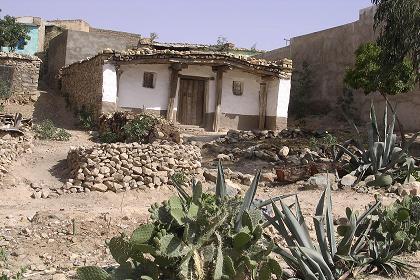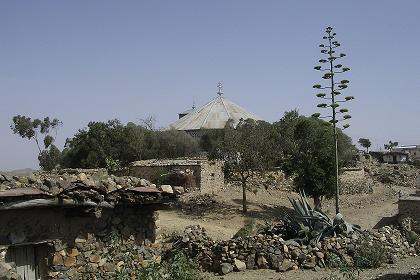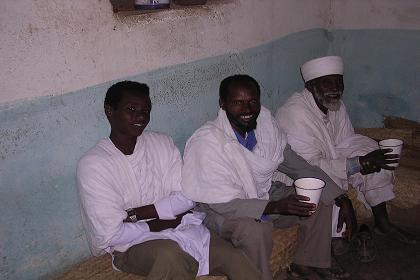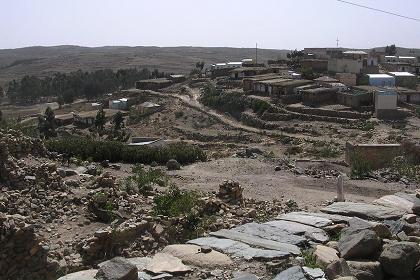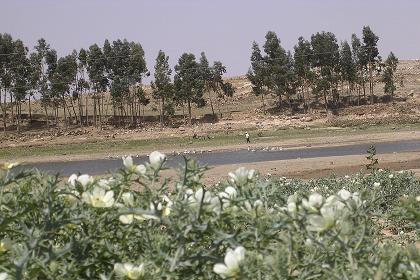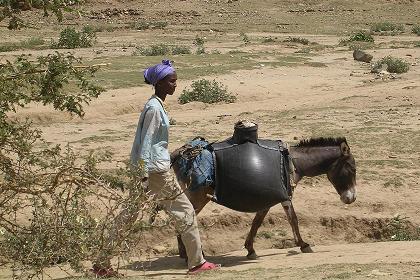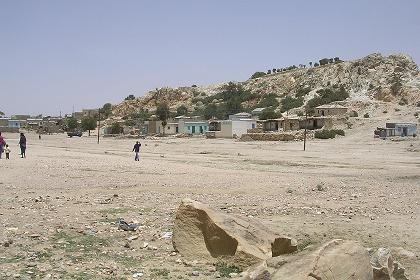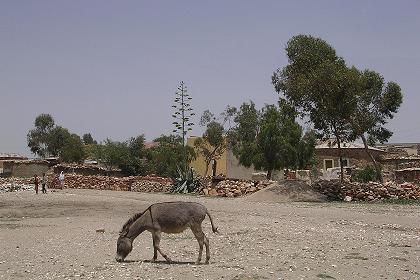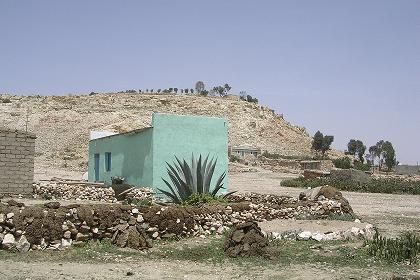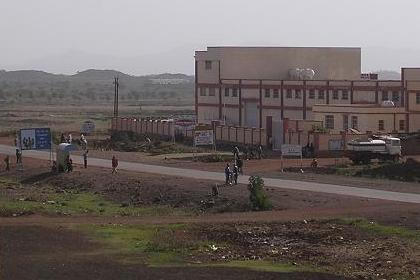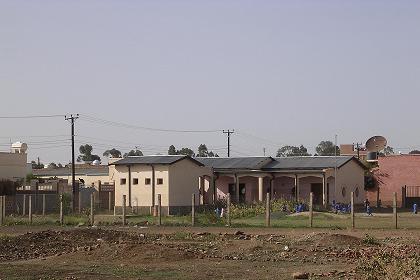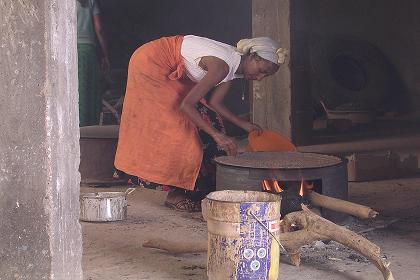| Eritrea May 2005 | ||||||
| Mon | Tue | Wed | Thu | Fri | Sat | Sun |
| 01 | ||||||
| 02 | 03 | 04 | 05 | 06 | 07 | 08 |
| 09 | 10 | 11 | 12 | 13 | 14 | 15 |
| 16 | 17 | 18 | 19 | 20 | 21 | 22 |
| 23 | 24 | 25 | 26 | 27 | 28 | 29 |
| 30 | 31 | |||||
| Eritrea June 2005 | ||||||
| Mon | Tue | Wed | Thu | Fri | Sat | Sun |
| 01 | 02 | 03 | 04 | 05 | ||
| 06 | 07 | 08 | 09 | 10 | 11 | 12 |
| 13 | 14 | 15 | 16 | 17 | 18 | 19 |
| 20 | 21 | 22 | 23 | 24 | 25 | 26 |
| 27 | 28 | 29 | 30 | |||
| next page | previous | |||||
| May
2005
- Celebrating the 14th anniversary of Eritrea |
||||||
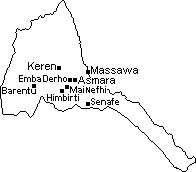 |
||||||
Emba Derho and Tsa' Edakristyan Eritrea - June 6th 2005
On my return trips from Keren I used to pass a small village close to a lake, called Emba Derho. Today I take the number 18 bus from Eritrea SQuare that will bring me to this village for only two Nakfa.
Emba Deho means "chickens mountain". I decide to climb the hill to have a good overview on the village. Children are following me and ask me my name. Villagers are greeting me when they pass. I guess it seldom happens that tourist visit this place. The children are excited. A man appears in the door opening and tells the children to leave.
On top of the hill is a small church. Next to the church is a Suwa bar. I am invited to sit with the men and to drink Suwa. I accept the invitation and an old man serves me a bowl with this typical Eritrean drink, tasting a bit like beer and containing some alcohol, that is stored in large blue tons. Some of the children are following me into the bar, but when I ignore them, they are gone.
The men do not speak any English, so there is not much of a conversation. When I finished my drink, I ask to whom and what I should pay. "Give him ten Nakfa", one man says, pointing to the old man. I guess the ten Nakfa if more than enough to buy them all a drink, but who cares? I leave ten Nakfa and proceed my tour through the village.
I snake through the small alleys, where chicken pick the last food from the ground, and dogs try to scare me without much success. children are greeting me, some want to shake hands. Donkeys with large rubber bags, and girls accompanying them are on their way to the small lake on the other side of the road, to collect water.
I follow them and walk around the lake, where a lot of large birds are catching fish. when I am back at the main road, the bus arrives. There is a lot of people waiting, so I do what every Eritrean would do: make a run for the door, and be sure to get in the bus, pushing back politely when necessary.
Back at Eritrea Square, I choose the number 19 bus to Tsa' Edakristyan, another small village on the other side of Asmara. Later I will hear that this is the village of Gebrehiwot. When the bus reaches Tsa' Edakristyan, it is not very clear to which way to go. The houses are scattered in the landscape, some on a hill.
When I pass a bar, I choose to share a table with an old man and order two tea, the only drink that is served. It is good to share and show respect to the elderly. I have learned my lessons. I walk for an hour, in circle around the hill. There is nothing special to see in this village and then return to the bus stop.
Next logical destination is Adi Guadad, bus number 20. By now I have learned the trick. When the bus enters the bus station, I calculate where the rear door well be when it stops. And when I grab one side of it, and the bus will tear me right in front of the door, so I am sure to have a seat.
Adi Guadad is more an industrial area. The residential area of village is very small. Just when I wonder what on earth made me choose this village as a destination, I pass a house where three women are making Suwa.
When I watch them, they invite me to sit and drink tea. One of them carries a small stool from the house, for me to sit on when I drink my tea and eat some hembesha, a flat Eritrean bread.
I witness the first stages of the production of the Suwa: dough is poured on top of an oven, heated with fuel wood, until the product has colored dark brown. I is turned to bake the other side, and when smoke comes off, it is removed and (when cooled down) broken into pieces.
These pieces of dark brown flat bread are then mixed with water and flavored with a type of buckthorn leaf called Gesho to ferment for a few days. The result is the Suwa I drank this morning in Emba Derho.
While waiting for the bus to go back to Asmara, I learn that here, next to the Santa Famiglia Pasta factory is the bus stop for the buses to Mai Nefhi and Himbirti, which will be tomorrows destination.
Traditional house (hidmo) - Emba Derho (chickens mountain) Eritrea.
On top of the hill - Emba Derho Eritrea.
Suwa bar - Emba Derho Eritrea.
Looking down from the hill - Emba Derho Eritrea.
Water reservoir - Emba Derho Eritrea.
Carrying water to the village - Emba Derho Eritrea.
Local scenery - Tsa' Edakristyan (just outside Asmara).
Local scenery - Tsa' Edakristyan (just outside Asmara).
Local scenery - Tsa' Edakristyan (just outside Asmara).
Santa Famiglia Pasta factory and bus stop to Asmara,
Mai Nefhi and Himbirti - Adi Guadad Asmara Eritrea.
Junior school - Adi Guadad Asmara Eritrea.
Woman making Suwa - Adi Guadad Asmara Eritrea.
